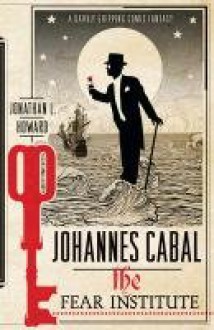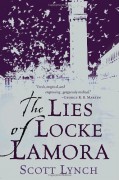
The Lies of Locke Lamora
by Scott Lynch
**Disclaimer: I read this book several months ago, and no, I didn't reread it before writing this review, so the accuracy of my recollections are questionable. However, I want to jot down my feelings about the first book before starting the second.
Let's start with the positives: heists. I love heists. Heist stories are probably the only subgenre that I routinely forgive for otherwise unforgivable plotholes, leaps in logic, improbabilities, and general ridiculousness because these aspects are inherently part of heist stories. Heist stories ask us to suspend our disbelief and follow our grey-morality protagonists into insanely complex schemes that inevitably fall apart, leading to David-and-Goliath showdowns where the protagonist seems certain to fail. And then there's the reveal: actually, the apparent failure was all part of the plan, or at least part of Plan M. For me, much of the enjoyment of heist stories comes from trying to guess Plan M. Lynch goes one better: even though we're informed that Lamora is effectively a genius, his overconfidence repeatedly leads him to make actual irreparable mistakes that in turn give the story a real tang of suspense.
Heist stories pretty much inherently involve antiheroes, with an immoral-if-possibly-noble band risking all to take on the establishment for fame, fortune, and sometimes, justice. The leader of the gang tends to be neurotic, depressive, and unstable; apparently these traits, as well as a tendency towards heavy drinking, are a prerequisite for constructing Plan Ms. Despite my love of heists, I tend to have issues with effectively amoral protagonists, and Lamora and his gang are certainly no inhabitants of Sherwood Forest. However, their motivation doesn't stem from greed, either: Lamora and his gang are primarily motivated by the rush and joy of the exploit itself. It's hard not to be carried along with their enthusiasm.
While the characters and the structure were somewhat weak points for me--I rather loathe flashbacks, and about half the book is composed of "intersessions"--my biggest issue was due to disappointed and possibly unrealistic expectations. Lynch came to my attention several years ago, when he defended his choice of having a PoC single mother pirate as a main character of Red Seas Under Red Skies. Like many others who are attracted to diverse casts in books, I immediately put The Lies of Locke Lamora on my TBR. However, while I can't (yet) speak for Red, I found Lies an utter disappointment where diversity was concerned.
As far as I could determine, the protagonists follow a heterosexual, white, male default (I suppose the excuse is that they are in Italy?), while minor villains remain the only people of color. Far from providing a strong female cast, Lies struck me as well below average, even for the genre, in terms of its representation of female characters. From start to finish, I can remember only six female characters who even earned the distinction of a name. (If I'm wrong about this, I'm sure someone will be along to correct me soon.) We're told that they're all strong and dynamic and complex, but their actions in the narrative beg to differ. Of those characters, one of them exists solely as a The Girl That Got Away/Lost Lenore--sure, she's not actually dead, but she's definitely gone, and thus literally exists in the story only in terms of her effects on the male protagonist. The analysis of the other five is spoilery; read at your own risk:
Next is Nazca, who actually exists solely to be Stuffed in the Fridge. She is introduced to us, has a brief conversation with Locke, and promptly dies. She dies in a humiliating way, without dignity, without agency, without a last stand, without even a bit of pagetime. She is the quintessential victim: the sole purpose for her death is to infuriate the men around her. The entire purpose of her character is to die, and the entire purpose of her death is (from the killer's perspective) to hurt the capa, and (from the narrative's perspective) to hurt Locke.
Then we have the Berengia Sisters. While they manage to make it through much more of the book than Nazca, they don't actually have agency; at first, they're working for the capa, and then they're effectively tools of their brother. Oh, yeah: then they die, promptly providing revenge motivations for the new capa. Seeing a trend yet? Next, we have the Spider. Her main role is to exist as a "twist": despite Lynch's occasional attempts to create a more gender-balanced society (see the Berengia Sisters as Muscle), both the reader and Locke's gang are clearly supposed to be amazed at the twist. A woman and a mastermind? How can this be?!? What a shocking reveal!!! Yet apart from her amazing gender, the Spider's actual actions are pretty darned incompetent: her first major action is to get tricked and enslaved by the Falconer; her second is to briefly trick and then be outsmarted by Locke. That's about it.
The most interesting female in the book, by far, and the one with the most agency, is Doña Salvarra. I have no complaints against her. While her role is primarily as the dupe of Lamora, she shows intelligence and agency.
(spoiler show)
But to have only six named female characters and only one--or possibly one-and-a-half-- of those with a role external to the men around her? That's pretty damned sad. Again, I don't think Lynch is any more problematic than, say, Rothfuss. I suppose it's my fault for expecting something more.
While my feelings about the characters were decidedly mixed, and my impression of Lynch as standard-bearer for diversity in SpecFic was thoroughly deflated, I still quite enjoyed Locke Lamora. I found myself thoroughly immersed in the rich worldbuilding. I loved how Lamora's arrogance and risk-taking are repeatedly addressed within the novel itself. Most of all, of course, I loved the heists. Bring on Red.


 Log in with Facebook
Log in with Facebook 



















